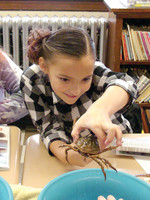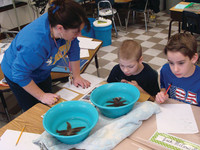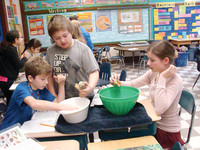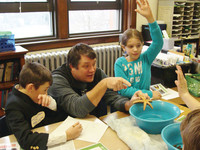The fourth grade students at E.T. Wyman Elementary school had some special animal guests Jan. 29. Students played with spider and hermit crabs, sea stars and a sea snail as part of the Save the Bay …
This item is available in full to subscribers.
We have recently launched a new and improved website. To continue reading, you will need to either log into your subscriber account, or purchase a new subscription.
If you are a current print subscriber, you can set up a free website account by clicking here.
Otherwise, click here to view your options for subscribing.
Please log in to continue |
|




The fourth grade students at E.T. Wyman Elementary school had some special animal guests Jan. 29. Students played with spider and hermit crabs, sea stars and a sea snail as part of the Save the Bay education program.
As the students picked up the small creatures, some braver than others, they were learning the essentials to being scientists, early data collection and most importantly, curiosity.
Nearly six years ago, Robertson received a $100,000 grant from the Defenders of Greenwich Bay to have the school participate in the program, which includes a classroom lesson and a boat trip out onto Narragansett Bay.
As the previous principal of Robertson Elementary, Lynn Dambruch, now director of Elementary Education, knew how beneficial the program was and decided to bring the program districtwide, having it in every 4th grade classroom throughout Warwick.
She announced the initiative at the end of June last year and $22,000 had been budgeted for the year. Save the Bay matched the funds. Overall, the program cost $44,000 to put on this year. The program also follows the 4th grade science curriculum. Save the Bay began making classroom visits in January and will start taking the classes out onto the bay from March until May.
“Warwick is right on the bay and it’s necessary the students learn how to be respectful to the environment now,” Dambruch said.
Already, she has heard positive feedback from all the participating teachers and principals about the benefit to students.
According to Eric Pfirrmann, Fleet Captain for Save the Bay and one of the educators visiting schools, Warwick is the only district in the state that hosts this program throughout all of its elementary schools.
“Warwick has recognized the benefit of our program, and that’s incredible,” Pfirrmann said. “It’s a great way to learn about the bay while getting them excited about science. You can sneak in the learning aspect without the students knowing.”
Trish Mercurio, whose 4th grade class was the first visited at Wyman, said every aspect of the science was incorporated in the lesson.
“This is just awesome,” she said.
She said teaching should return to being explorative, just like the Save the Bay program, letting students follow what interests them with teacher guidance.
Pfirrmann said it’s critical to foster science skills in children because they will need them for the rest of their lives no matter what they go into. He said problem solving and the ability to do research are crucial for any school subject or career path.
Meghan Kelly, one of Save the Bay’s education specialists, joined Pfirrmann at Wyman. Both agreed that students love this program and appreciate being able to come up close and personal with the bay and its inhabitants.
“Whenever we do this program, kids eyes just light up. It’s a great experience for them,” Kelly said. “They are so excited to touch them.”
Because Narragansett Bay is so important and influential throughout Rhode Island, students, more often than not, want to share stories of their own experiences, from beach trips to summers out sailing.
Especially for students at Wyman, many of them living along the Pawtuxet River, which drains straight into the bay, it’s important to get students invested in their natural resources and that “what they do on land and in school affects the water,” Kelly said.
Although Pfirrmann is a big proponent of the science skills the Save the Bay program provides he also said, “These students will grow up to be the next generation to take care of the bay. For them to protect the bay, they need to appreciate it now.”
“This makes learning real,” Wyman principal Ron Celio said. “It’s brought the bay to life.”
He said the students have a “natural curiosity for the bay because they see it nearly every day. He said being able to work closely with the animals makes sure students understand their responsibility in protecting them.
“They will grow to become better decision makers, because they know it’s a fragile ecosystem,” he said.
Comments
No comments on this item Please log in to comment by clicking here